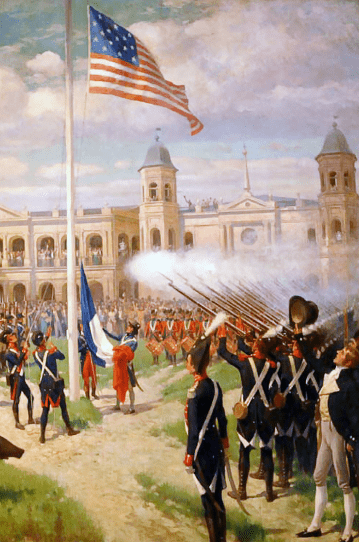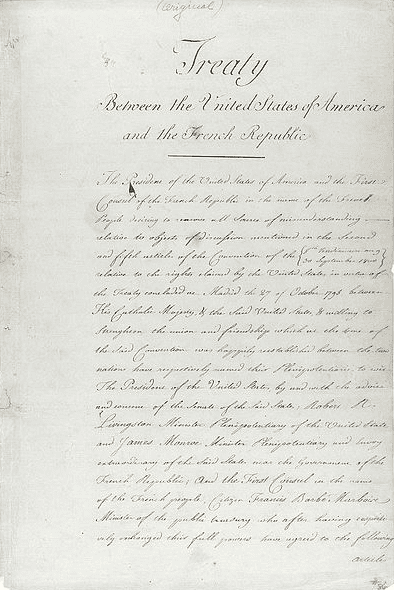In 1802 President Thomas Jefferson sent two representatives to France, James Monroe and Robert Livingston, to negotiate the purchase of New Orleans from Napoleon Bonaparte. Jefferson’s agents were authorized to offer up to $10 million for the Mississippi River port, vital to American shipping interests. Imagine their astonishment when the French government offered to sell not only New Orleans, but its huge territory of Louisiana – for $15 million!

The Americans had come to strike a bargain at precisely the most opportune time. A slave revolt in Saint-Domingue (i.e., Haiti) had dimmed French hopes of controlling the lucrative sugar islands in the Caribbean. With military affairs in Europe occupying his thoughts, Napoleon was willing to turn his back on French dreams of a North American empire.
On 30 April 1803 in Paris, the U.S. and France signed a treaty for the Louisiana Purchase – the French loss, overwhelmingly, was America’s gain. For $15 million the U.S. acquired a vast area of more than 800,000 square miles, stretching from the Gulf of Mexico to Canada, and from the Mississippi River to the Rocky Mountains, encompassing portions of 15 modern-day U.S. states and two Canadian provinces.

The Louisiana Purchase posed a dilemma for President Thomas Jefferson, as he was uncertain of his legal authority to make such a deal. A strict constructionist, Jefferson had misgivings because he knew the U.S. Constitution did not confer any authority for acquiring territory. However, the opportunity to double the size of the U.S. for less than three cents an acre overcame Jefferson’s scruples.
The following four newspaper articles are about the Louisiana Purchase. The first article, published in June of 1803 before the treaty had been formally announced, speculates on the success of the American negotiations. President Jefferson announced the treaty’s existence when it arrived in Washington, D.C., on July 4 that year. The last three newspaper articles were all published after Jefferson’s announcement.

Here is a transcription of this article:
The report from the Philadelphia Gazette, respecting the cession of Louisiana, is by no means improbable. The situation of the European powers, at the time of Mr. Monroe’s arrival in France must have proved highly favorable to his cordial reception at the court of St. Cloud. Under existing circumstances, Bonaparte may consider the sale of Louisiana to the United States, for a moderate consideration, far preferable to embroiling himself with this country. The Western borders of the Mississippi present sufficient scope for his ambition, and should his views look towards Mexico, the amity of our western settlers will be essential to his projects. The sum of Three Millions of Dollars in hand, with the liquidation of our claims for French spoliations, which may amount to Ten or Twelve Millions more, is no contemptible consideration to France, connected moreover, with the security of our neutrality in case of a war with England. On the other hand, should this bargain succeed, the acquisition of this important Key of the Mississippi for Twelve or Fifteen Millions of Dollars, may be estimated as a very cheap purchase, much less than the conquest would, in all probability, cost. A small proportion of this money would be sent out of the country, as the remainder would go towards reimbursing those of our fellow-citizens, who were pillaged of their property during the French revolutionary war. – N.Y.D. Adv.
INTERESTING.
It is confidently reported, that letters have been received in this city from France, to the end of April, which state, that Mr. Monroe had arrived in Paris, where he had been cordially received by the French government; and that it was generally understood, Mr. Monroe had succeeded in an arrangement by which the United States will acquire important territorial rights on the Mississippi.
We do not presume that there is much credit to be reposed in the above; although it is by no means unlikely, that from the present peculiar situation of France, Mr. Monroe may be able to obtain advantages which otherwise would not have been ceded.
Since writing the above, we have obtained, from a respectable commercial house, the following extract of a letter, from their correspondent at Bourdeaux, dated April 24:
“It is certain that Mr. Monroe’s negotiation at Paris is in a fair way. It is even said that there is no doubt about the cession of Louisiana to the United States, on condition that the latter settle all claims of their individuals against the French Republic, and pay Three Millions of Dollars in the bargain.” – Relf’s Gaz.
A report was yesterday in circulation, which, though its substance may be realized, we apprehend has not yet been actually so. It was, that the object of Mr. Monroe’s mission had been already accomplished, under the condition of the United States assuming the debts due by France to citizens of the United States. – Aurora.

Here is a transcription of this article:
This is a proud day for our nation. Louisiana is ours! The Executive, and the sticklers for its infallibility may say it is a proud day for it also. But let them not be too hasty. Let us see with what stipulations the cession of that country is clogged – whether they are such as will jeopardize our neutrality in the contest which at the moment appeared inevitable and has now certainly commenced. Let us also be fully acquainted with the price of the purchase – and whether the relation of France with the rest of Europe being well known, we could not have obtained it on better terms; nay, whether we could not have secured it to ourselves on as cheap conditions from France, as France did from Spain – for nothing – and have saved the millions which Mr. Monroe is said to have paid. – Fed. Gaz

Here is a transcription of this article:
The most important intelligence with which we present our readers this day, is the sale of Louisiana by the First Consul [i.e., Napoleon] to this government. This event will doubtless be advantageous to the country; though it may cost many millions. One condition in the purchase is that an indemnity be made to our citizens for losses during the [French] Revolution, and by the unjust detention of property in French ports. Four millions is to be allowed by the French to repay us. The probability is that they have demanded as much for the territory in cash as they would, had this demand of our citizens never existed. The annexation of this tract of country to the general jurisdiction of the United States, is of incalculable consequence to this government.

Here is a transcription of this article:
OFFICIAL.
The Executive have received official information that a Treaty was signed on the 30th of April, between the Ministers Plenipotentiary and Extraordinary of the United States and the Minister Plenipotentiary of the French government, by which the United States have obtained the full right to and sovereignty over New-Orleans, and the whole of Louisiana as Spain possessed the same. – Nat. Intel.
Note: An online collection of newspapers, such as GenealogyBank’s Historical Newspaper Archives, is not only a great way to learn about the lives of your ancestors – the old newspaper articles also help you understand American history and the times your ancestors lived in, and the news they talked about and read in their local papers.
Explore over 330 years of newspapers and historical records in GenealogyBank. Discover your family story! Start a 7-Day Free Trial
